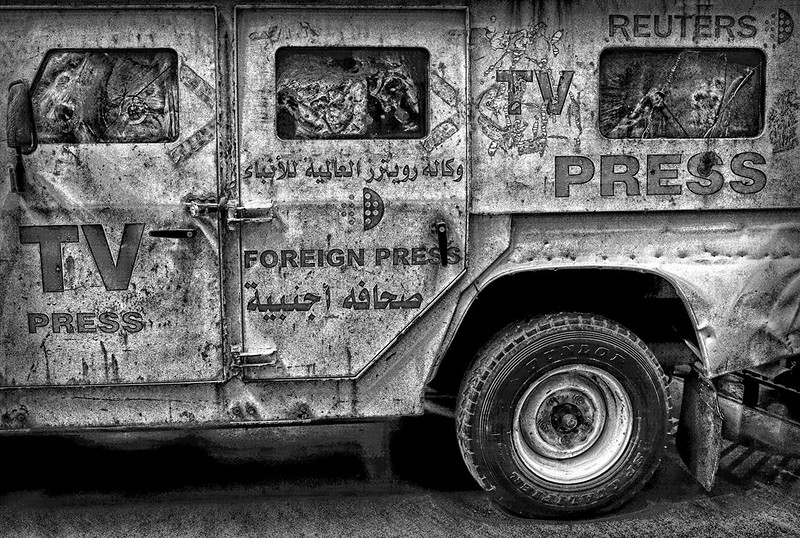Unlike previous wars, Israel is denying international journalists access to Gaza. Media organisations should unite in outrage.
Samer Badawi is a Palestinian American writer and contributor to +972 Magazine.
Cross-posted from Common Dreams

In just 51 days, Israel’s 2014 war on Gaza, dubbed “Operation Protective Edge,” claimed the lives of 526 Palestinians under the age of 18. I reportedon many of their stories, interviewing surviving relatives like Alaa Balata. He was 17 on July 29 of that year, when an Israeli tank shell struck his home in the Jabalia refugee camp, killing all seven of his siblings and both of his parents. I met him as he was scraping their flesh from the wall.
Balata’s story, the stories of the Bakr boys, and others chronicled by various international journalists reporting from Gaza at the time could not fully capture that war’s impact on children. But measured against Israel’s current campaign to wipe Hamas “off the face of the Earth,” Operation Protective Edge barely registers. Nearly seven times as many children have already died in the current war’s first 25 days, and with Israel’s ground invasion underway, that number is set to rise dramatically.
For those of us who have reported first-hand on the plight of Gaza’s children, the scenes now emerging from the besieged enclave have defied description. Our loss for words, though, is not born of shock alone. Unlike previous wars it has waged on Gaza, Israel has barred all outside journalists from reporting on the ground. This reduces mainstream coverage of the war’s human cost to a roster of dead and injured, a series of digits reported in the aggregate—and now always with the compulsory footnote, “according to the Hamas-run Ministry of Health.”
While western media organizations insist that this caveat is necessary, their argument—that reporters outside Gaza cannot independently verify the horrifying stories emerging from there—has rarely been followed by an equally public insistence that journalists be allowed into Gaza to report for themselves.
On October 29, the French outlet Le Mondecalled for open access to Gaza for the press, but no such petition, to my knowledge, has been made public by other mainstream outlets. This acquiescence is especially dangerous because it gives Israel carte blanche to undermine the media’s crucial work in other ways, including by targeting Palestinian camera operators, producers, and reporters, who are the public’s only eyes and ears on the ground.
The Committee to Protect Journalists (CPJ) has already documented at least 36 cases of journalists killed during this war. CPJ also notes that many local journalists, like hundreds of thousands of other Palestinians in Gaza, have had to relocate, forcing them to “abandon reporting equipment, documents, and protective gear” as they fled Israeli bombardment. With fewer of these journalists able to report on the aftermath of Israel’s bombing campaign, evidence of the massive civilian death toll will be lost in the rubble, undermining any future inquiries into the conduct of this war.
Resisting Israel’s stranglehold on media coverage took on new urgency on October 27, when Gaza’s access to the Internet and both its telephone networks was severed. Although some residents could still connect to Israeli cellphone towers, nearly all of Gaza’s 2.3 million residents were suddenly cut off from the outside world and from each other, leaving dispersed family members unable to communicate—or call for an ambulance—during a night of unprecedented air, land, and sea bombardment. The head of Palestine’s main communications company, Paltel Group, blamed Israel for the disruption.
Although Internet and phone connections appeared to be restored by Sunday morning Gaza time, there were reports of widespread outages again on Wednesday, November 1. These are a harrowing reminder of the costs that a longer-term disruption could exact. Beyond shutting down a vital lifeline for families and emergency services, the communications failure meant that Palestinians in Gaza lost the ability to share real-time reports of Israel’s ongoing attacks, essentially silencing the legion of citizen journalists who have been tirelessly documenting what they see and hear on social media.
Even Al Jazeera, one of the few news channels broadcasting live from Gaza, was blindsided by the outage. Although its cameras were still rolling, its reporters were unable to communicate with eyewitnesses throughout Gaza who help track the location of individual airstrikes. With no way to determine where a story was unfolding, Al JazeeraArabic’s Wael Dahdouh, who lost four members of his immediate family in an October 25 Israeli airstrike, took up position on a rooftop and had his cameraman pan in the direction of explosions as they were happening, all while relying on his knowledge of the landscape to tell viewers where the bombs were falling.
As Israel’s ground incursions intensify and the humanitarian crisis gripping Gaza grows more dire by the hour, it will become even more difficult for journalists who are already there to access and report on the scenes of human suffering. With no guarantee that the enclave’s communications infrastructure will remain online during Israel’s ongoing attacks, the prospect of a war waged in the dark, especially in the context of repeated Israeli calls for mass expulsion, should prompt immediate action by international media organizations.
Although their access to Gaza may no longer be possible through Israel, where the Erez crossing will likely remain closed, guaranteeing journalists safe entry through Egypt’s Rafah border remains the responsibility of the Israeli military. Insisting that Israel facilitate this entry, with the full cooperation of Egyptian officials, should be an urgent priority for international media organizations. Their first-hand reporting, which would complement that of the brave Palestinian journalists already on the ground, will only become more crucial in the coming days and weeks.


Be the first to comment